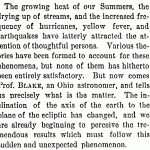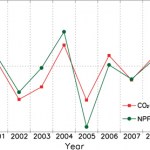Communication and Politics
Andy Revkin recently asked us to consider this 1881 New York Times article and judge whether it's an example of early global warming alarmism or satire. It was unearthed by pseudoskeptic Steve Goddard, prompting Andy to write:
For some reason Goddard avoids pasting into his blog post the humorous, almost Twain-like, elements later in the article that clearly show the author was not exactly taking the astronomer's assertions very seriously.
By the time I got to Goddard's blog, he added this to his post:
[addendum] This 1881 article is satirizing one of the more alarmist explanations for the…
Four years after Al Gore unleashed his army of slide show presenters on the planet in an attempt to spread the word that climate is something we should be worried about, the polls show public opinion has budged hardly at all. If anything, opposition to climate-change mitigation strategies has only hardened. Why?
Some, like Chris Mooney, have turned their attention to the idea that there's a link between political ideology and psychology. There could be something to that, although it's unclear what's the cause and what's the effect. But University of British Columbia geographer Simon Donner…
One of the things that keeps me from throwing in the blogging towel in an era when climate change denial seems to be a prerequisite for membership in the party of Abraham Lincoln is the quality of the comments I get. The praise is nice, the thoughtful exploration of the ideas I introduce is better, but what I really enjoy are the snarky swipes at my character by those who can't come up with anything more cogent to post than a dismissive reference to Star Trek. See here for a typical example,
The first thing that occurred to me when such comments began to appear -- almost immediately after I…
Last week it was the abuse of a 140-character context-free nano-report on an hour-long discussion on the challenges of communicating science. This week it's the credulous coverage of a 50-page report on climate change. Seems that no matter the length of the material at hand, there are plenty of people eager to jump to conclusions without having the decency to stop and think first.
At least there was no slander this time. But damage has been done to the credibility of climatology, thanks to that old adage, a little knowledge is a dangerous thing. Now claims of unwarranted alarms have that much…
I've long been ambivalent about the merits of Twitter. Some may recall my "Why Twitter is Evil" post of a while back. That was written with one cheek mostly occupied by my tongue. It now seems clear that, whatever the original designs, the 140-character telegraph has become an invaluable network-building and maintenance tool, particularly for authors, activists trying to organize constituencies. This is all well and good. But the medium's dark side recently became all too clear following this past weekend's wonderful Science Online 2011 conference.
The story begins Saturday afternoon at an…
There's an advertising feature in the latest GQ that champions 17 "Rock Stars of Science." Each ad includes a genuine rock music star alongside three or four genuine scientists, some Nobel laureates among them. The idea is to make science sexy.
Will it work? Chris Mooney, co-author of Unscientific America, is one of the minds behind the campaign. if you want to know more about it, head on over to his Intersection blog, where he writes about the risks of the project:
Was it an absolute requirement for them to carry on like this (see right) to make their point?
Unfortunately yes--if they were…
I'm still trying to avoid blogging at the moment but the news that Science Friday may not last much longer deserves to be brought to as wide an audience as possible. Apparently, the National Science Foundation no longer believes supporting the show is part of its mandate.
Heard live each Friday beginning at 2 p.m. on many, though not all, NPR stations, Science Friday is simply one of the most valuable two hours of radio programming anywhere. In an era in which corporate anti-science campaigns have made reasonable discourse nearly impossible on a wide variety of critical subjects involving…
Much is being and will be written about Bjorn Lomborg's volte face on climate change. After a decade of denial -- not of the reality of anthropogenic warming, but of the threat it poses to civiliation -- the Skeptical Environmentalist now says:
"If we care about the environment and about leaving this planet and its inhabitants with the best possible future, we actually have only one option: we all need to start seriously focusing, right now, on the most effective ways to fix global warming."
Is this worthy of a blog post? In a perfect world, no. But then, in a perfect world, I would be…
Former New York Times environment reporter Andrew C. Revkin was, once upon time, considered the leading light in that small community of professional journalists who have the luxury of devoting most of their working hours to climate change. Not so much anymore.
Since leaving the Times a few months back to assume the role of senior fellow for environmental understanding at Pace University, Revkin has maintained his quasi-journalistic role as the blogger behind the times Dot Earth blog. But the big change over the past year or so involves his reputation among other climate bloggers.
It's not…
I'll be reviewing Heidi Cullen's new book Weather of the Future shortly. She's already on the talk show circuit. Here's her appearance on Colbert:
The Colbert Report
Mon - Thurs 11:30pm / 10:30c
Heidi Cullen
www.colbertnation.com
Colbert Report Full Episodes
2010 Election
Fox News
A couple of scientists at the University of Montana say they have detected a small but non-negligible decline in global terretrial "net primary production." NPP is basically a way of measuring plant growth -- how much carbon they're removing from their surroundings and turning into biomass. To my mind, there are two noteworthy aspects to their research, which just appeared in Science. Both led to me to the phrase that is the title for this post, although each use carries distinct meanings.
First, "Drought-Induced Reduction in Global Terrestrial Net Primary Production from 2000 Through 2009"…
It would be preferable to simply ignore Christopher Monckton's seemingly laughable attempts to undermine climatology, but given the power of the Internet to turn long-discredited arguments into serious threats to academic freedom, such a strategy would not be wise. Monckton has launched a campaign against John Abraham of St. Thomas University for daring to demolish the former's mendacious presentations on global warming. Abraham's repost is thorough and devastating. So devastating and damaging to Monckton's credibility is it that Monckton is asking for his acolytes to flood the university…
There's more than a few climate bloggers who have a dirty little secret. We like to excoriate those who can't tell the difference between weather and climate, or herald every momentary drop in temperature as evidence that global warming has ended, or revel in each new report that suggests not every single square millimeter of the planet's surface is experiencing dramatic climate shifts. As we should. But many of us take a peek, every morning, at the daily version of a graph from the National Snow and Ice Data Center depicting current sea-ice extent in the Arctic.
We know that what happens…
Yet another vindication for climatology. The Muir Russel inquiry into the behavioral ethics of the climatologists at the heart of the CRU email nonsense has found...
...nothing to substantiate the complaints. Except to say that the researchers should in the future exhibit "the proper degree of openness."
"We find that their rigor and honesty as scientists are not in doubt." There. Can we move on now? I'm losing count of the number of inquiries that come to such a conclusion.
Penn State's internal investigation into climatologist Michael Mann's integrity is over. The conclusion:
The Investigatory Committee, after careful review of all available evidence, determined that there is no substance to the allegation against Dr. Michael E. Mann, Professor, Department of Meteorology, The Pennsylvania State University.
More specifically, the Investigatory Committee determined that Dr. Michael E. Mann did not engage in, nor did he participate in, directly or indirectly, any actions that seriously deviated from accepted practices within the academic community for proposing,…
My first reaction to the papier du jour among climate communications activists was "meh." It's not that Chris Mooney's latest ruminations on the gap between what the public thinks about scientific issues and what scientists have to say isn't worth reading. It's just that we've been down this road so many times now, the standards of what passes for new and remarkable are getting rather high.
That didn't stop Andy Revkin, Joe Romm, and Evil Monkey from posting lengthy and hard-hitting responses, though. So I gave it a second look, and I've now concluded that "Do Scientists Understand the Public…
The more peer-reviewed papers a climatologist has published and the more often those papers are cited, the more likely it is that the researcher supports the science underpinning anthropogenic climate change (ACC). That's the conclusion of a paper published this week in the Proceedings of the National Academy of Sciences.
This comes as absolutely no surprise to anyone working in or following the field. But scientists like to put numbers to things, and the paper, "Expert credibility in climate change" does a pretty good job of doing just that.
There's a marvelous, interactive, graphical…
Few stories about climatology generated as much attention, positive and negative as one by Jonathan Leake in London's Sunday Times back in January. "UN climate panel shamed by bogus rainforest claim" claimed that references to threats to the Amazon rainforest from global warming were "based on an unsubstantiated claim by green campaigners who had little scientific expertise." As pretty much anyone without an ulterior motive who bothered to look into the matter quickly discovered, that wasn't true. Now, more than five months later, the Times has apologized for the story.
Joe at Climate…
In a desperate bid to help staunch the propagation of a particularly insidious meme, I offer this attempt to help clear up any confusion:
Mike Hulme and Martin Mahony of the School of Environmental Sciences University at East Anglia have a paper forthcoming in Progress in Physical Geography that explores the IPCC, "its origins and mandate; its disciplinary and geographical expertise; its governance and organisational learning; consensus and its representation of uncertainty; and its wider impact and influence on knowledge production, public discourse and policy development."
The paper does…


